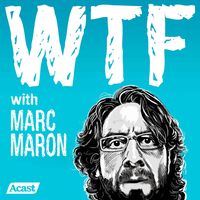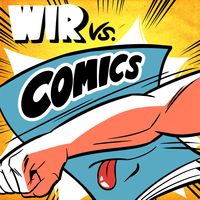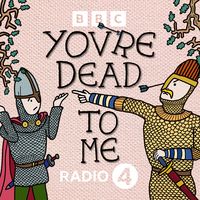The Cold War, Prohibition, the Gold Rush, the Space Race. Every part of your life - the words you speak, the ideas you share - can be traced to our history, but how well do you really know the stories that made America? We'll take you to the events, the times and the people that shaped our nation. And we'll show you how our history affected them, their families and affects you today. Hosted by Lindsay Graham (not the Senator). From Wondery, the network behind American Scandal, Tides of History, American Innovations and more.You can binge new seasons of American History Tellers early and ad-free on Wondery+. Join Wondery+ in the Wondery app or on Apple Podcasts.
https://wondery.com/shows/american-history-tellers/?utm_source=rss
Gesamtlänge aller Episoden: 9 days 9 hours 35 minutes
recommended podcasts
- all
- season 1
- season 2
- season 3
- season 4
- season 5
- season 6
- season 7
- season 8
- season 9
- season 10
- season 11
- season 12
- season 13
- season 14
- season 15
- season 16
- season 17
- season 18
- season 19
- season 20
- season 21
- season 22
- season 23
- season 24
- season 25
- season 26
- season 27
- season 28
- season 29
- season 30
- season 31
- season 32
- season 33
- season 34
- season 35
- season 36
- season 37
- season 38
- season 39
- season 40
- season 41
- season 42
- season 43
- season 44
- season 45
- season 46
- season 48
- season 49
- season 50
- season 51
- season 52
- season 53
- season 54
- season 55
- season 56
- season 57
- season 58
- season 59
- season 60
- season 61
- season 62
- season 63
- season 64
- season 65
- season 66
- season 67
Listen Now: The Price of Paradise
When ex-Bunny girl Jayne Gaskin spots the desert island of her dreams for sale online, she decides to risk it all. Trading in their English village home, Jayne and her family relocate to their own private paradise, just off the coast of Nicaragua. And a reality TV crew follows them to film a new show, No Going Back. But soon they all discover that paradise has its secrets. The locals claim the island belongs to them, and it’s been sold illegally. Jayne’s not leaving without a fight...
episode 3: World War I | The Spring Offensive
In January 1918, after months of preparation and planning, American troops finally started to arrive in Europe in significant numbers. But the U.S. was still far from combat ready. Its economy was struggling to adapt to the demand for war supplies and the U.S. forces in Europe were still heavily reliant on British and French support. But America and the Allies were running out of time...
History Daily: The Hillsborough Stadium Disaster
April 15, 1989: A crowd crush at a soccer game at Hillsborough Stadium in Sheffield, England leads to the deaths of 97 Liverpool fans. You can listen ad-free in the Wondery or Amazon Music app. Or for all that and more, go to IntoHistory.com. History Daily is a co-production of Airship and Noiser. Go to HistoryDaily.com for more history, daily. See Privacy Policy at https://art19.com/privacy and California Privacy Notice at https://art19.com/privacy#do-not-sell-my-info.
episode 2: World War I | The Yanks Are Coming
In the spring of 1917 the U.S. moved closer to entering the Great War. German submarines resumed attacks against American ships, and a secret German telegram urging Mexico to wage war on the U.S. came to light, enraging the public. As he prepared to lead the nation into the conflict, President Woodrow Wilson faced daunting challenges. He would have to transform the Army, reshape the economy and crack down on internal dissent. And for German-Americans, U.S...
episode 1: World War I | Preparedness
In June 1914, a gunman assassinated Archduke Franz Ferdinand, the heir apparent to the Austro-Hungarian Empire. This event set off a chain reaction that plunged Europe’s major powers, and the wider world, into all-out war. President Woodrow Wilson was determined to keep the United States out of the conflict, but when German submarine attacks put American lives at risk, the American people would become divided over how to respond to the increasing threat See Privacy Policy at https://art19...
Listen Now: American Scandal
In the 1990s and early 2000s, Enron was like no corporation on earth. It was the ultimate corporate success story. But the key to Enron’s success? Accounting fraud. At the time, the scale of illegal manipulation of the American financial system was unprecedented. The sheer breadth and complexity of Enron’s crimes stunned the world, and in the aftermath, many wondered how such massive fraud could go undetected for so long. This is just a preview of American Scandal...
History Daily: The Hale-Bopp Comet
April 1, 1997. The Hale-Bopp Comet reaches the closest point to the sun on its long loop through space, presenting a magnificent spectacle to stargazers on Earth. You can listen ad-free in the Wondery or Amazon Music app. Or for all that and more, go to IntoHistory.com. History Daily is a co-production of Airship and Noiser. Go to HistoryDaily.com for more history, daily. See Privacy Policy at https://art19.com/privacy and California Privacy Notice at https://art19...
episode 3: Encore: Lewis and Clark I The Long Way Home
After 18 months and over two thousand miles, Lewis and Clark’s Corps of Discovery had reached the Pacific Ocean. Now, they would have to find their way back. And in a last-ditch bid for glory, they would split up the Corps into smaller groups, hoping to map more river routes and make contact with more Native American tribes. But the plan would backfire, putting the entire expedition at risk, even as the end of their journey was finally within reach. See Privacy Policy at https://art19...
episode 2: Encore: Lewis and Clark I Across the Rockies
In the spring of 1805, Lewis and Clark resumed their journey up the Missouri River in search of the Pacific. But to reach the ocean, they would have to cross the towering Rocky Mountains. It was a forbidding task, and one they couldn’t achieve alone. They would need the help of their young interpreter, Sacagawea, and her tribe, the Shoshone. But first, they had to locate the elusive Shoshone – and with winter fast approaching, time was running out. See Privacy Policy at https://art19...
Listen Now: The Spy Who
These are stories you were never meant to hear. The invisible but vital work of the world’s intelligence services: secret operatives playing to very different rules. The Spy Who, hosted by Indira Varma and Raza Jaffrey, takes you deep inside that shadow world to meet spies who risked everything in the national interest – or, sometimes, their own...








































